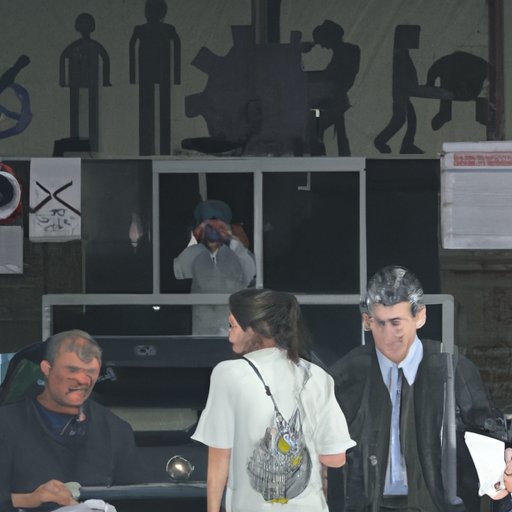
I. Introduction
Mental health awareness has become an increasingly important issue in modern society. Although we have come a long way in terms of recognizing and treating mental health challenges, there is still much work to be done. In this article, we will explore the history of mental health awareness, looking at some of the key milestones and challenges that have shaped our understanding of this critical issue.
Over the course of this article, we will delve into the various beliefs about mental health throughout history, from ancient times to modern day. We will examine how stigma and misinformation have held back progress, and discuss specific events and individuals who helped to spark the mental health awareness movement. We will also explore some of the early theories and treatments surrounding mental health challenges and examine the impact of mental health advocacy groups on modern mental healthcare.
Our goal is to provide readers with a comprehensive understanding of the history of mental health awareness, including key insights and developments that are still shaping the field today.
II. A Brief History of Mental Health Awareness: Tracing Its Roots from Ancient Times to Modern Day
Beliefs about mental health have varied throughout history and across different cultures. In ancient times, mental health challenges were often believed to be the result of supernatural or divine factors. Disorders such as depression, anxiety, and psychosis were often treated with mysticism and superstition, with shamanistic practices and exorcisms commonly used to try to “cure” these ailments.
As scientific thinking began to emerge in the Western world, new ideas about mental health began to emerge. In the 18th and 19th centuries, mental illness was often seen as a sign of moral weakness or a lack of self-control. Labeling someone as “insane” could lead to a lifetime of institutionalization and inhumane treatment in asylums.
It wasn’t until the 20th century that mental health awareness began to evolve into a more nuanced and compassionate understanding of mental illness. In the mid-1900s, a growing number of scientists and mental health professionals began to recognize that mental health challenges were not caused by moral failings or divine curses, but by chemical imbalances in the brain that could be medically treated.
III. The Evolution of Mental Health Awareness: How Stigma and Misconceptions Held It Back for Centuries
Despite these breakthroughs, stigma and misconceptions about mental health continued to hold back progress for decades. Those struggling with mental health challenges were often shunned and ostracized, leading to further isolation and despair.
Up until relatively recently, most people failed to understand the true nature of mental health challenges. Instead, they viewed mental illnesses as something to be feared and avoided. Those who did suffer from mental health challenges were often blamed for their own struggles and told to just “snap out of it.”
As a result of these attitudes, many people with mental health challenges suffered in silence. They were afraid to speak out for fear of being stigmatized and unable to access the care and resources they needed to recover.
IV. The Turning Point: A Look at the Pivotal Moments that Sparked the Mental Health Awareness Movement
The mental health awareness movement owes a debt of gratitude to numerous pioneers in the field. These individuals and organizations helped to break down barriers and raise awareness about the importance of mental health care and support.
One of the key milestones in the history of mental health awareness was the publication of the book “Madness and Civilization” by philosopher Michel Foucault in 1961. His work helped to create a more nuanced understanding of mental health challenges by exploring how they had been viewed and treated throughout history.
Another pivotal moment in the history of mental health awareness was the establishment of Mental Health America in 1909. This organization helped to promote awareness and support for those with mental health challenges, as well as advocating for better policies and resources for those suffering from mental illness.
These and other events helped to spark a sea change in how mental health challenges were understood and addressed. Instead of being seen as weaknesses to be shamed and avoided, they began to be recognized as legitimate medical conditions that required proper care and treatment.
V. Making Sense of Madness: The Early Ideas and Theories Surrounding Mental Illness
Throughout history, numerous theories have been put forth to try to explain the causes of mental illness. Early cultures often believed that such illnesses were caused by supernatural or mystical forces, and that they could be cured with religious rituals or mystical practices.
In the Middle Ages, mental illnesses were often seen as a sign of demonic possession. Those suffering from such illnesses were subjected to exorcisms, torture, and other brutal treatments aimed at driving out the supposed “evil spirits.”
It wasn’t until the 18th and 19th centuries that more scientific understandings of mental illness began to take hold. Physicians and psychiatrists began to look for physical or medical explanations for mental health challenges. This led to the development of early treatments such as bloodletting, purging, and electroshock therapy. These treatments were often ineffectual, and sometimes resulted in serious harm to the patient.

VI. From Institutionalization to Empowerment: How Mental Health Advocacy Has Transformed Mental Healthcare
Today, mental healthcare has come a long way from the inhumane practices of the past. Thanks to the tireless work of mental health advocates, policies and resources have been put in place to help support those struggling with mental health challenges.
Advocacy groups like the National Alliance on Mental Illness and the American Psychological Association have played a critical role in raising awareness and promoting mental health care. They have fought for better resources for those struggling with mental illness, as well as working to break down the stigma and misconceptions that continue to surround mental health.
Policies such as the Americans with Disabilities Act have also helped to support those with mental health challenges, ensuring that they have the same opportunities and protections as those without such challenges.
VII. The Future of Mental Health Awareness: Promising Developments and the Work That Still Needs to Be Done
Despite the progress that has been made, there is always more work to be done when it comes to mental health awareness. Fortunately, there are many promising developments on the horizon that could help to revolutionize the way we approach mental health challenges.
One such development is the growing use of teletherapy and other online mental health resources. These tools can help to connect mental health professionals with people in need, no matter where they are located.
Other innovations include the growing use of technology to monitor and track mental health challenges, as well as the development of new medications and treatments to better target mental health challenges at the biological level.
Despite these advancements, much work still needs to be done to overcome the stigma and prejudices that still surround mental illness. We must continue to push for better resources, policies, and understanding when it comes to this critical issue.
VIII. Conclusion
In conclusion, the history of mental health awareness is a complex and multifaceted story. From the superstitions and stigma of the past to the advancements and challenges of the present, mental health awareness has come a long way.
However, there is much work still to be done when it comes to ensuring that everyone has access to the resources and support they need to achieve optimal mental health. By continuing to raise awareness, fight stigma, and advocate for better policies and resources, we can build a brighter future for mental health care.
If you or someone you know is struggling with mental health challenges, don’t hesitate to reach out for help. The more we talk about mental health, the less stigmatized it becomes. Let’s work together to create a world where mental health is just as valued and supported as physical health.




